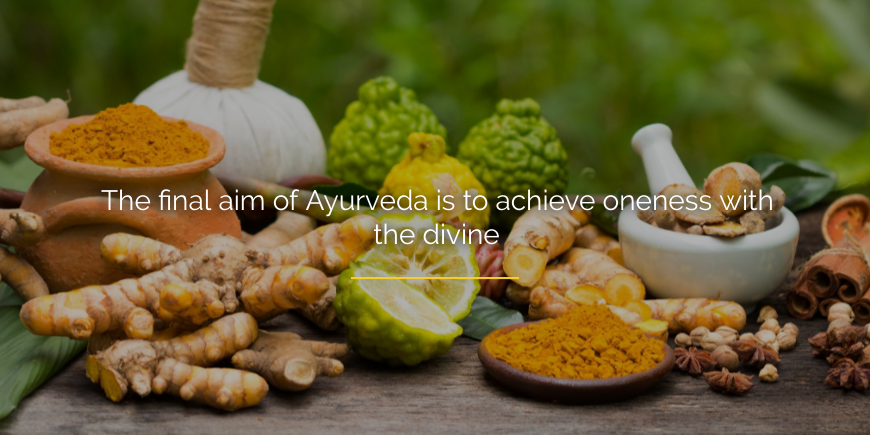
Introduction
Ayurveda is like an assistant science to yoga. Its purpose is to help a soul to maintain its physical presence and increase its chances of salvation in its current life.
The definition of Ayurveda in the classical texts contains its essence. Let us look at the classical definition of Ayurveda as described in Charak Samhita.
Definition of Ayurveda
Hitahitamsukhamdukhamayustasyahitahitam|
-Manamchyatraoktamaayurvedasauchyate||
Charak Samhita
Meaning
The science that talks about the beneficial and harmful life, the happy and the miserable life, and the span of each type of life is called Ayurveda.
Spiritual and material status are the two dimensions that define the ayu(age/life) of an individual.
The beauty of the above shloka is that it focuses on the spiritual aspect of Ayurveda. The final aim of Ayurveda is to achieve oneness with the divine. According to Charak Samhita, the sages discovered Ayurveda in a transcendental state. They aimed to ensure a healthy and misery-free existence for all living beings. Therefore, Ayurveda emerged to provide healthy life, that is useful for spiritual development.
However, Ayurveda does not discriminate between a sage and a sinner. The Vedic people believed that all life experiences eventually lead to spiritual development.And a sinner deserves and needs better opportunities than a Saint.
This shloka conveys that Ayurveda has tailor-made solutions for each type of life, irrespective of its spiritual level. It is there to improve the quality of life for everyone, whether the person is a sinner or a sage. Therefore, Ayurveda defines all kinds of lives, their qualities, patterns, possible lifespans, etc.

Summary
Ayurveda has a spiritual origin. It evolved from the meditation experiences of the ancient sages. Therefore, it is not only a body of knowledge but a treasure of wisdom. The primary aim of Ayurveda is to assist living beings to achieve the final aim of life – salvation.
The Spiritual Essence
According to Ayurveda, there can be 4 kinds of lives –
- Hitayu or the beneficial life
- Ahitayu or the non-beneficial life
- Sukhayu or the happy/comfortable life
- Dukhayu or the miserable/uncomfortable life
The ancient Vedic people believed that the far end of life is not death. Death is another beginning. We all have a treasure of mental impression called samskara. These samskaras lead us into learning cycles of birth and rebirth.
Ancients believed that our future birth depends on the way we live our current life. We can do good deeds and earn spiritual merit or engage in evil activities and lose the spiritual shine.
The four kinds of lives described above, lead to different results in another realm, after death. Ayurveda aimed to elongate and ensure optimal use of every life. Let’s look at the meaning of these lives and the way Ayurveda can improve them.
Summary
Ayurveda defines four kinds of lives based on their spiritual and material value and helps the individual to strike a balance between the spiritualand material life and reach the final aim – salvation. These four types of lives are – hitayu or the beneficial life, ahitayu or the non-beneficial life, Sukhayu or the happy/comfortable life, dukhayu or the miserable/uncomfortable life.
Hitayu
The word “Hita” means beneficial. The ultimate benefit of a soul is to get past its samskara or karmic bonds. “Hitayu” is a righteous life. Such a life might or might not be comfortable but it creates minimum bonds and relieves an individual from the past karmas. A life of remembrance and pursuit of spiritual development is what Hitayu means in the truest sense.
Ahitayu
Contrary to the “Hitayu”(righteous life), Ahitayu is a badly lived life. The word “ahita” means harmful. A life lived under the influence of greed, anger, arrogance, deceit, lust, and violence is most harmful to a soul. Such a life creates painful negative sanskaras that lead to karmic bonds for many more births. It is like a credit card badly used, which creates a huge loan on an individual. Interestingly, such a life might look to be very comfortable and even lavish from the outside. But it is nothing less than jail for the soul. Thus, Ayurveda also offers psychological treatment to such patients so that their quality of life can improve.
Sukhayu
The word sukha signifies comfort, pleasure, and abundance. However, it is one distinct parameter in Ayurveda. Comfort is the second level of consideration about the type of life a person is living. A comfortable life might or might not be virtuous. But it is comfortable on the physical dimension. For example, a virtuous person might have a very healthy body, a happy family, and good finances. At the same time, a vicious person might be extremely wealthy and have everything at his disposal. Both of these people have a comfortable life.
Dukhayu
According to the Vedic tradition, the biggest wealth is a healthy body. Therefore, the biggest loss is a diseased or disabled body. The word “dukkha” means misery or discomfort. The biggest factor for discomfort is an unhealthy condition. Apart from that, an unhappy family life, lack of friends or well-wishers, bad social status, and poverty are multiple factors that form a Dukhayu(miserable life). Like Sukhayu(comfortable life), a virtuous person can experience a lot of physical and mental trauma in a corrupt society. He can fall sick despite his good character. At the same time, a vicious person, a drug addict, or a person with bad character can also ruin his life and become sick and poor. In this way, both these people will experience a miserable life, irrespective of their character or conduct.
Summary
A life well-spent in good deeds is hitayu. It helps to reduce karmic ties. Ahitayu is the opposite – a sinful life. Sukhayu (comfortable life) and dukhayu (uncomfortable life) refer to the level of material comfort one had in her life. A combination of these two factors – spiritual and material aspects of life help to define the overall karmic outcome.
Spiritual Significance of Lives
Ayurveda might classify a person as having a hita-dukhayu(righteous but uncomfortable life) or hita-Sukhayu (righteous but comfortable life). It is a very important parameter to define the subject of the treatment – the individual. This is important because the most suitable treatment of the person will emerge naturally from his current state of spiritual and mental health.
An interesting point to contemplate is that Ayurveda offers health to all without discrimination. Whether an individual is wise or malicious, rich or poor, Ayurveda offers the best treatment to a person according to their mental and physical ability. For example, Ayurveda recommends a non-vegetarian meal for a rajasic (action-oriented) or tamasic (ignorant) person, but a vegetarian diet for a satvic (intellectual) person because the meal is not only for the body but also for the mind. A person with Ahitayu might need psychological treatment as well. Similarly, treatment protocols differ according to the type of people and their conditions. Thus, the treatment offered under Ayurveda is personalized in the true sense.
Take Away
Ayurveda defines lives based on spiritual and material levels, a unique classification. Ayurveda offers a distinct dietary, lifestyle, and treatment approach for all kinds of lives. Therefore, it does not try to drag a sinful person towards spirituality. Nor does it allow a diseased person to suffer in the name of providence. Ayurveda offers treatment options, personalized to the spiritual levels of a person. It helps him to get cured and continue his journey of self-development with ease. Enroll now and embark on a journey of self-discovery and healing.
Responses